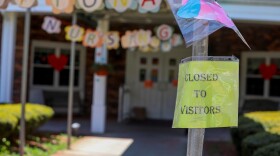Putting someone you love in a nursing home is never easy, but it’s always reassuring to know that you can visit them anytime you want. Except that now, when your loved one needs you most, you’re unable to visit because of the coronavirus pandemic.
My Grandfather Tom had been in a nursing home for the past four years and in the assisted living facility for the past two. My mom and Aunt Kelly used to visit my grandpa at least once a week.
He suffered from dementia so they would come in to help feed him, change his clothes, or just be there as a familiar face to jog his memory. However, when the pandemic hit they were left wondering, “Now what?”
“The biggest feeling that I had was me never being able to see him again,” Aunt Kelly said.
She couldn’t help but imagine him alone in his room without anyone to keep him company. She says there were many things that kept her up at night, such as whether or not he was eating, sleeping, or doing his daily activities.
Making more contact
For a while my aunt didn’t have any contact with my grandpa. It wasn’t until a few weeks later when they finally set up scheduled phone calls.
“In the beginning it was hard because they tried to do just a phone call, and he was having problems because he couldn’t hold up the phone. And then right away they came in with video chats,” she said.
The video chats really helped lift both my aunt's and grandpa's spirits during such a difficult time. He was able to recognize her and engage in better conversations. They were also able to have some fun with the video chats. My grandpa loved to sing. He was in a quartet when he was younger, and my aunt loves nothing more than listening to his deep, raspy voice.
“My husband and I would play Johnny Cash and a bunch of different songs on the laptop, and we would sing with him. And he loves to sing "Happy Birthday," so regardless of if it was my birthday or not, he would still sing it,” she said.
Overall, my aunt was satisfied with the way the nursing home had been communicating with her about my grandpa. Eventually she was able to schedule in-person meetings with him and sit 6 feet apart across a table. She says she has no complaints.
The constant battling of the virus
But for some people, however, they can’t say they have had as smooth or positive of an experience.
I decided to reach out to Paula Mueller. She’s the founder and president of Elderly Advocates in the Cleveland area. The nonprofit aims to improve the quality of life for those in long-term care facilities.
A big issue she’s noticed during the pandemic is a staffing shortage in the facilities.
“There’s almost not one facility that’s not short staffed," Mueller said. "People are quitting because they’re in fear of taking [the virus] home to their families. They're afraid of getting it. The pay for an aide in a nursing home is not that far off from McDonalds or Walmart, and it'd be a less high risk of a job for them to have."
There have also been instances where some of the health care workers weren’t being responsible outside of the facilities. She believes this is one of the main reasons COVID-19 has gotten in. Mueller explains that a solution to this would be having family members come in and care for their loved ones.
“We feel the family members are the lowest risk because they will do all they can to be responsible when they’re not in the facility so that they don’t give their family member COVID,” she said.
More time with less risk
With the help of Ohio House Bill 770, families could be allowed in nursing homes to provide more hands-on care. The bill would permit essential caregivers to enter the facilities during the pandemic to provide support to the residents.
In an 8-0 vote, bill passed through the the state legislature's Aging and Long-Term Care facility committee. The legislation is to be voted on by the House floor, and if passed, it will move onto the Senate.
“There’s federal laws that have resident rights, and it's their right to have visitors of their choice. And if they can’t make decisions, their representative’s choice,” Mueller said.
As we continue to see a rise in COVID-19 cases, nursing home residents continue to be put at a high risk of contracting the virus.
Too many families are losing their loved ones, and my family ended up being one of them. My grandpa contracted the virus from a staff member and passed away in November. We’re left behind with his memories and hope the new vaccine will help stop this virus.








